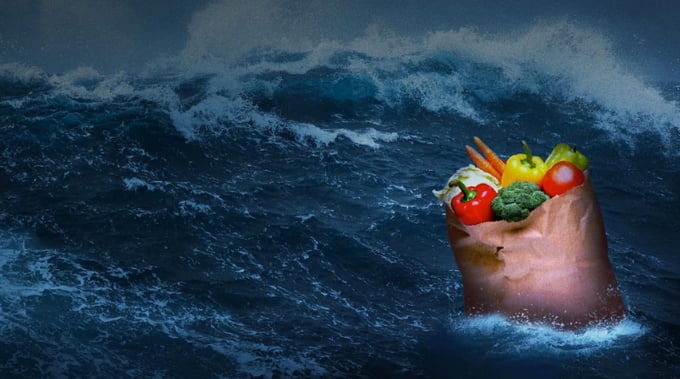June 17, 2025 | 21:34 GMT +7
June 17, 2025 | 21:34 GMT +7
Hotline: 0913.378.918
June 17, 2025 | 21:34 GMT +7
Hotline: 0913.378.918

Illustration: Shoshana Gordon/Axios
Why it matters: Any decrease in agricultural production could further spike food costs and exacerbate the state of food insecurity across the country.
The latest: Forecasts suggest the coming El Niño is likely to start between this summer and fall, layering onto effects from human-caused climate change that will effectively usher in sweeping changes to weather patterns.
Typically the climate cycle results in a wetter, cooler southeastern U.S., while regions like the Central Plains could be drier and possibly warmer, according to Virginia Tech professor Zachary Easton, who researches agricultural ecosystems, food production and climate change.
He notes that when you add naturally occurring events like El Niño to a warming climate, there are "going to be consequences in your production system," citing how past El Niño events drove "big disruptions" in American crop production.
What they’re saying: Agricultural economist Jennifer Ifft tells Axios that if El Niño ends up intensifying the prolonged drought in the Central and Southern Plains, the results would be "economically devastating."
"The drought we've been seeing in the region has actually contributed to high crop prices ... everywhere," says Ifft, a Kansas State associate professor.
Our thought bubble, per Axios' Andrew Freedman: El Niño events tend to leave much of the Plains warmer than average during the winter, when its influence on North American weather peaks.
While El Niño is predicted, there is no guarantee it will develop.
Between the lines: If it does occur, an El Niño event could make the extreme situation in states like Kansas "actually worse," according to Ifft, with national ramifications in the form of increased grocery prices for goods like wheat, corn, soybean and sorghum, as well as even costlier meat.
The nation's leading wheat producer, Kansas is experiencing the lowest winter wheat crop health — or vegetation index — it has seen in 20 years, per EarthDaily Agro data shared with Axios.
Of note: The price we pay for food in the U.S. isn’t just reflective of yields, but the whole supply chain.
A 2022 paper in Nature Food found that climate shocks and extreme weather events can adversely impact crop production, with the potential for cascading impacts on the food supply-chain, such as limiting food availability and negative influences on food production, demand and export costs.
Plus, Ifft says there’s a livestock connection, as regional drought and water scarcity have resulted in a declining beef herd population, which “will affect meat prices in the long run."
Zoom out: The El Niño-Southern Oscillation, or ENSO, is one of the biggest sources of natural variability in global climate.
Estimates suggest ENSO events, which include El Niño, affect yields on over a quarter of global croplands, with impacts varying based on location, crop types and ENSO phases.
The intrigue: In some cases, El Niño can make things harder for plants, but conversely it can also be beneficial for growing seasons, according to Amir Jina, a climate researcher at the University of Chicago.
A 2014 study in the journal Nature Communications looked at the ENSO effects on global yields for four major crops: Maize, rice, wheat and soybean.
In the case of soybeans, global yields actually improved under El Niño, while maize, rice and wheat saw yield declines under both El Niño and La Niña.
Meanwhile: El Niño's highly variable impacts on food supply will be outsized for countries relying heavily on subsistence agriculture, an added concern for already drought-stricken regions across Africa and Central America.
Yes, but: Even for developed nations like the U.S., the potential food security impacts of El Niño would still be felt "across the board" when compounded with high food costs and climate impacts, which the U.S. government should be paying close attention to, according to Jina.
"Coping with this level of variability means ... there's still this human cost," says Jina. "What happens to the farmer who has to go bankrupt this year, because it's just this extra shock of vulnerability that they weren't expecting?"
The bottom line: "I think that's what makes this effectively something like a tinder box."
(axios)

(VAN) Extensive licensing requirements raise concerns about intellectual property theft.

(VAN) As of Friday, a salmonella outbreak linked to a California egg producer had sickened at least 79 people. Of the infected people, 21 hospitalizations were reported, U.S. health officials said.

(VAN) With the war ongoing, many Ukrainian farmers and rural farming families face limited access to their land due to mines and lack the financial resources to purchase needed agricultural inputs.

(VAN) Vikas Rambal has quietly built a $5 billion business empire in manufacturing, property and solar, and catapulted onto the Rich List.

(VAN) Available cropland now at less than five percent, according to latest geospatial assessment from FAO and UNOSAT.

(VAN) Alt Carbon has raised $12 million in a seed round as it plans to scale its carbon dioxide removal work in the South Asian nation.

(VAN) Attempts to bring down the price of the Japanese staple have had little effect amid a cost-of-living crisis.